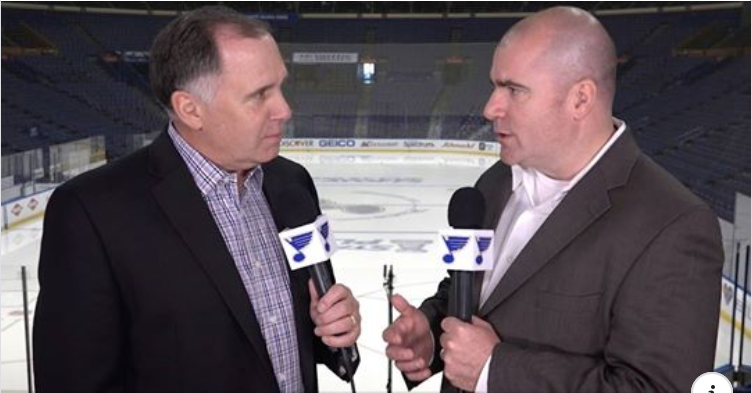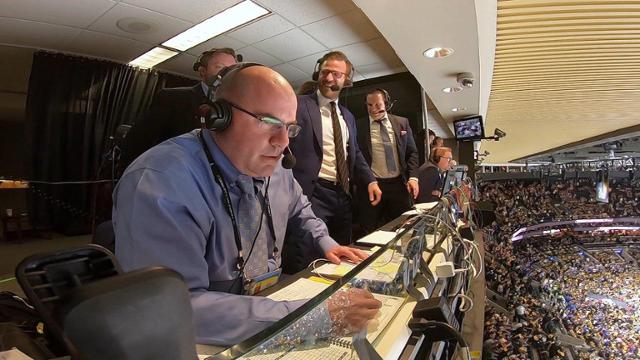
Chris Kerber
 Nearly every Musial Awards honoree describes their act of grace, class or selflessness as “a no-brainer” or “the right thing to do.” Blues broadcaster Chris Kerber is no different. Many honorees react spontaneously, in the moment. Chris’s decision to share the radio booth with TV colleague John Kelly, though, was decades in the making.
Nearly every Musial Awards honoree describes their act of grace, class or selflessness as “a no-brainer” or “the right thing to do.” Blues broadcaster Chris Kerber is no different. Many honorees react spontaneously, in the moment. Chris’s decision to share the radio booth with TV colleague John Kelly, though, was decades in the making.
As a young broadcaster, Chris knew when his efforts had fallen flat or needed more polish. For pointers and inspiration, he listened over and over to a tape given to him by his father, Lou: a collection of Blues highlights through the years. “I studied Dan Kelly, Ken Wilson and Jack Buck,” he said. “I listened to Dan whenever I needed to work on capturing the image of the game.”
The gesture also harkened to a turning point in his career. Working with the Coyotes’ minor league affiliate, Chris was called up on an emergency basis to provide color for a Flyers-Coyotes game in 2000. Instead, Coyotes lead announcer Curt Keilback turned the play-by-play over to Chris for the second period. He used the tape of that period when he applied for the Blues job.
“Curt did it for me. You don’t forget gestures like that,” he said. “If I can give someone a chance, the way that I got a chance, I will.”
And every playoff season, Chris wrestled with the inherent unfairness of the TV networks usurping coverage in the second round, leaving local broadcasters out in the cold. “You see these guys more than your own family. Maybe you’re down because you’ve missed your daughter’s recital. They’re your sounding boards,” he said. “They put in the same amount of time as we do on the radio, but get cast aside after the first round.”
 Chris was ready in 2016, when the Blues advanced to the Western Conference Final. Because they lost to San Jose, though, he never got the chance to broach the subject. So, on the night in May when the Blues defeated the Sharks to advance to the Stanley Cup Final, he pounced, asking John to take over play-by-play for the second period of each game of the coming series. Chris told John how that tape of his father had helped put him in this position, so that sharing the booth seemed natural and obvious. Chris wasn’t going to take no for an answer. Which, of course, was John’s initial response.
Chris was ready in 2016, when the Blues advanced to the Western Conference Final. Because they lost to San Jose, though, he never got the chance to broach the subject. So, on the night in May when the Blues defeated the Sharks to advance to the Stanley Cup Final, he pounced, asking John to take over play-by-play for the second period of each game of the coming series. Chris told John how that tape of his father had helped put him in this position, so that sharing the booth seemed natural and obvious. Chris wasn’t going to take no for an answer. Which, of course, was John’s initial response.
“I said, ‘You don’t have a choice,'” Chris said. So he told John’s family what he wanted to do, not to apply peer pressure, “but because I wanted them to hear that Dad is as respected in the business as their grandfather.”
John acquiesced, calling Chris’s gesture, “beyond amazing. I don’t know of any other broadcaster that has done something like that before.”
Their broadcast colleagues were so captivated that the pair did several interviews during the Finals. “At one point, I said to John, ‘We’ve got to stop this. We need to keep the story on the ice.'” Even as the 2019-20 season got underway and broadcasters gathered for their annual preseason meetings, “we were still hearing kind words from our colleagues, which is high praise. Doesn’t mean I deserve it, though,” Chris said.
So, when he learned of the Musial honor, “I was dumbfounded. Living here, you know the impact Stan had on this community, not just for his Hall of Fame career but for the kind of man he was long after his playing days were over. To get an award in his name leaves you speechless − which is tough for a broadcaster.”